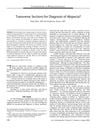 22 citations,
March 2000 in “Clinics in Dermatology”
22 citations,
March 2000 in “Clinics in Dermatology” Many treatments for hair loss lack proper testing and FDA approval, so their effectiveness is uncertain.
June 2024 in “Ecotoxicology and Environmental Safety” Finasteride harms Daphnia magna's reproduction, growth, and metabolism.
6 citations,
May 2021 in “Aesthetic Surgery Journal” Higher cell number PRP improves hair density and diameter more than lower cell number PRP.
 September 2023 in “JEADV Clinical Practice”
September 2023 in “JEADV Clinical Practice” People with common hair loss conditions may have a higher risk of heart disease and related health issues.
Curcuma aeruginosa Roxb. may help treat hair loss by affecting specific biological pathways.
 January 2024 in “International Journal of Molecular Sciences”
January 2024 in “International Journal of Molecular Sciences” Blocking the protein CXCL12 with a specific antibody can increase hair growth in common hair loss conditions.
 8 citations,
March 2022 in “Journal of The Taiwan Institute of Chemical Engineers”
8 citations,
March 2022 in “Journal of The Taiwan Institute of Chemical Engineers” Extracts from a type of brown seaweed can help promote hair growth.
 April 2024 in “Clinical dermatology review (Print)”
April 2024 in “Clinical dermatology review (Print)” Most women aged 20-40 in the study lost hair diffusely and in volume over 6 weeks to 6 months, mainly due to telogen effluvium, often without a clear cause.
 7 citations,
December 2021 in “Pharmaceutics”
7 citations,
December 2021 in “Pharmaceutics” Natural products like plant extracts can help promote hair growth and could be used to treat hair loss.
 1 citations,
May 2023 in “Cell reports medicine”
1 citations,
May 2023 in “Cell reports medicine” Sons of mothers with polycystic ovary syndrome (PCOS) have a higher risk of obesity and insulin resistance, possibly due to certain genes and factors passed down from their mothers.
 37 citations,
December 2010 in “Clinics in Dermatology”
37 citations,
December 2010 in “Clinics in Dermatology” Aging alone rarely causes significant hair loss; hormones are a bigger factor.
 28 citations,
April 2010 in “British Journal of Dermatology”
28 citations,
April 2010 in “British Journal of Dermatology” Genetic marker rs12558842 strongly linked to male hair loss.
 April 2024 in “Human genomics”
April 2024 in “Human genomics” Identified genes linked to male-pattern baldness may help develop new treatments.
 27 citations,
May 2017 in “Marine Drugs”
27 citations,
May 2017 in “Marine Drugs” Undariopsis peterseniana extract helps hair grow by activating certain cell growth pathways and could be a new treatment for hair loss.
 102 citations,
July 2007 in “Genes & Development”
102 citations,
July 2007 in “Genes & Development” A mother's PPARγ is crucial for preventing harmful milk that can cause inflammation and growth problems in babies.
May 2023 in “Journal of Cosmetic Dermatology” Androgenetic alopecia is linked to higher cardiovascular and metabolic risks, possibly due to irisin resistance.
 January 2017 in “Journal of Investigative Dermatology Symposium Proceedings”
January 2017 in “Journal of Investigative Dermatology Symposium Proceedings” The 2015 Hair Research Congress concluded that stem cells, maraviroc, and simvastatin could potentially treat Alopecia Areata, topical minoxidil, finasteride, and steroids could treat Frontal Fibrosing Alopecia, and PTGDR2 antagonists could also treat alopecia. They also found that low-level light therapy could help with hair loss, a robotic device could assist in hair extraction, and nutrition could aid hair growth. They suggested that Alopecia Areata is an inflammatory disorder, not a single disease, indicating a need for personalized treatments.
 August 2016 in “Journal of Investigative Dermatology”
August 2016 in “Journal of Investigative Dermatology” Some men don't respond to common hair loss treatments, but a new inhibitor, FOL-005, shows promise for targeting unwanted hair growth.
 2 citations,
November 2013 in “Elsevier eBooks”
2 citations,
November 2013 in “Elsevier eBooks” Hormones control reproduction and are crucial for body balance.
 90 citations,
June 2006 in “The American Journal of Dermatopathology”
90 citations,
June 2006 in “The American Journal of Dermatopathology” The document concludes that accurate diagnosis of different types of hair loss requires careful examination of hair and scalp tissue, considering both clinical and microscopic features.
 3 citations,
October 2015 in “Human Psychopharmacology-clinical and Experimental”
3 citations,
October 2015 in “Human Psychopharmacology-clinical and Experimental” Finasteride doesn't affect sleep spindles in men.
 6 citations,
August 2020 in “Journal of Pharmaceutical Innovation”
6 citations,
August 2020 in “Journal of Pharmaceutical Innovation” Nanoemulgel improves hair growth and quality using finasteride without irritation.
 24 citations,
August 2005 in “The American Journal of Dermatopathology”
24 citations,
August 2005 in “The American Journal of Dermatopathology” Vertical sections are better than horizontal sections for diagnosing alopecia.
 34 citations,
August 2003 in “Clinical and Experimental Dermatology”
34 citations,
August 2003 in “Clinical and Experimental Dermatology” Pregnant women's hair gets thicker.
 19 citations,
January 2012 in “Biomolecules & Therapeutics”
19 citations,
January 2012 in “Biomolecules & Therapeutics” Grateloupia elliptica extract may help prevent hair loss and promote hair growth.
1 citations,
October 2022 in “Biomedicines” Prdm1 is necessary for early whisker development in mice but not for other hair, and its absence changes nerve and brain patterns related to whiskers.
 18 citations,
December 2016 in “Phytomedicine”
18 citations,
December 2016 in “Phytomedicine” Curcuma aeruginosa essential oil effectively reduces hair growth and lightens underarm skin.
3 citations,
October 2023 in “Cosmetics” Healthy lifestyle changes can significantly improve skin health as you age.
March 2024 in “Agriculture” CRISPR/Cas9 gene-editing shows promise for improving sheep and goat breeding but faces challenges with efficiency and accuracy.
 20 citations,
October 2006 in “Skin Research and Technology”
20 citations,
October 2006 in “Skin Research and Technology” Women with AGA have less hair on midscalp, more thin and non-growing hair.























